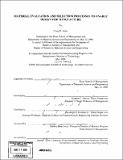Material evaluation and selection processes to enable design for manufacture
Author(s)
Abler, Craig Bennett, 1975-
DownloadFull printable version (3.446Mb)
Other Contributors
Leaders for Manufacturing Program.
Advisor
Stephen C. Graves and Randolph E. Kirchain, Jr.
Terms of use
Metadata
Show full item recordAbstract
In order to optimize product designs it is necessary to quickly evaluate many candidate materials in terms of performance and processing costs. Evaluation using physical prototypes yields concrete results but is time intensive and costly when dealing with multiple optimization objectives. As an alternative, computer aided simulation is a reliable means of material evaluation and selection, is increasingly available to smaller companies due to the shrinking cost of computation, and is essential for handling the dual optimization objectives of manufacturability and performance in a timely and cost effective manner. To support this thesis, the author first examines iRobot Corporation's current process of experimental trial and error for evaluating and selecting a polymer material for use in the wheels of its robotic military vehicles. The author then demonstrates that the experimental derived performance results can be reasonably predicted using the viscoelastic properties of polymers, as captured in such models as the standard linear solid model, and that this predictability can be used to quickly simulate wheel performance with computer aided engineering (CAE) tools. (cont.) Finally, the author performs a cost analysis of the current material evaluation/selection process versus the CAE approach to show the best path forward for incorporating CAE tools into the design process of smaller corporations like iRobot.
Description
Thesis (M.B.A.)--Massachusetts Institute of Technology, Sloan School of Management; and, (S.M.)--Massachusetts Institute of Technology, Dept. of Materials Science and Engineering; in conjunction with the Leaders for Manufacturing Program at MIT, 2006. Includes bibliographical references (p. 71).
Date issued
2006Department
Leaders for Manufacturing Program at MIT; Massachusetts Institute of Technology. Department of Materials Science and Engineering; Sloan School of ManagementPublisher
Massachusetts Institute of Technology
Keywords
Sloan School of Management., Materials Science and Engineering., Leaders for Manufacturing Program.